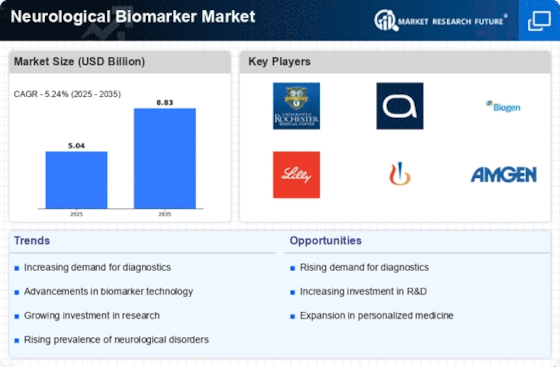Advancements in Biomarker Technologies
Technological innovations in biomarker discovery and validation are transforming the landscape of the Neurological Biomarker Market. The advent of high-throughput screening methods, next-generation sequencing, and advanced imaging techniques has significantly enhanced the ability to identify and characterize neurological biomarkers. These advancements facilitate the development of more accurate and reliable diagnostic tools, which are essential for the timely identification of neurological disorders. As a result, the Neurological Biomarker Market is witnessing an influx of novel biomarkers that can improve patient outcomes and streamline clinical workflows. The integration of artificial intelligence and machine learning in biomarker analysis further augments this trend, suggesting a promising future for the industry.
Growing Demand for Personalized Medicine
The shift towards personalized medicine is significantly influencing the Neurological Biomarker Market. As healthcare moves away from a one-size-fits-all approach, there is an increasing emphasis on tailoring treatments based on individual patient profiles. Neurological biomarkers play a pivotal role in this paradigm shift by enabling clinicians to identify specific disease subtypes and predict treatment responses. The market for personalized medicine in neurology is projected to grow at a compound annual growth rate of over 10% in the coming years. This trend underscores the importance of biomarkers in developing targeted therapies, thereby driving the demand within the Neurological Biomarker Market.
Rising Prevalence of Neurological Disorders
The increasing incidence of neurological disorders such as Alzheimer's disease, Parkinson's disease, and multiple sclerosis is a primary driver of the Neurological Biomarker Market. According to recent estimates, the number of individuals affected by these conditions is projected to rise significantly, with Alzheimer's alone expected to affect over 14 million people by 2050. This surge in prevalence necessitates the development of effective diagnostic tools and treatment options, thereby propelling the demand for neurological biomarkers. As healthcare systems strive to manage these growing patient populations, the Neurological Biomarker Market is likely to experience substantial growth, driven by the need for early detection and personalized treatment strategies.
Regulatory Support for Biomarker Development
Regulatory agencies are playing a crucial role in fostering the growth of the Neurological Biomarker Market by providing frameworks that support biomarker development and validation. Initiatives aimed at expediting the approval process for biomarkers are encouraging pharmaceutical companies to invest in this area. For instance, the FDA has established programs that facilitate the qualification of biomarkers for use in drug development and clinical trials. This regulatory support not only accelerates the introduction of new biomarkers into the market but also enhances the credibility of these tools among healthcare professionals. As a result, the Neurological Biomarker Market is likely to expand as more validated biomarkers become available for clinical use.
Increased Investment in Research and Development
The Neurological Biomarker Market is benefiting from heightened investment in research and development activities. Pharmaceutical companies and research institutions are increasingly allocating resources to explore novel biomarkers that can aid in the diagnosis and treatment of neurological disorders. This trend is evidenced by the substantial funding directed towards clinical trials and biomarker validation studies. In 2023, it was reported that R&D spending in the neurology sector reached approximately 30 billion USD, reflecting a growing commitment to advancing neurological research. Such investments are likely to yield innovative biomarkers that can enhance diagnostic accuracy and therapeutic efficacy, thereby driving the growth of the Neurological Biomarker Market.

















